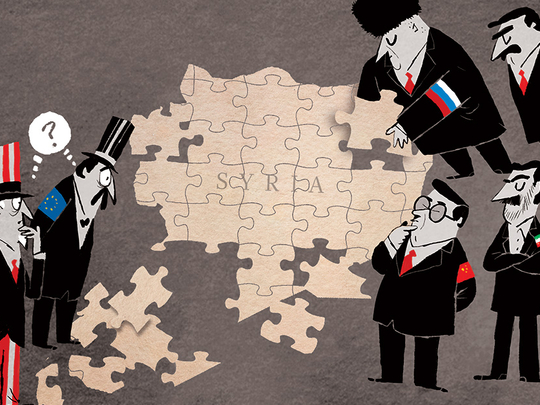
A Manichean propaganda made of unconfirmed sources, biased information and faked videos has led the Western press to wonder whether Aleppo had been freed from Daesh (the self-proclaimed Islamic State of Iraq and the Levant), Al Nusra and other terrorists or on the contrary, surrounded and conquered by its own National Army with the help of Russian and Iranian allies. Given this logic, Mosul in Iraq can only be ‘liberated’, but Syrian Aleppo, only be ‘overrun’.
It is when the US President Barack Obama declares that “President Bashar Al Assad and Iran have blood on their hand”, or US Representative at the UN, Samantha Powers, claims that “(the Russian) should be ashamed for that”; as if war was a ‘one-fighter only’ game. But the US have no blood on their hand, everyone knows — especially when nobody knows the number of civil casualties in the US-led Iraqi war (they were never released). As to Obama, he seems too busy undermining his successors than reasoning smartly about the region.
It is also when European diplomacy, notably French Foreign Minister Jean-Marc Ayrault, sends ‘warnings’ to Bashar Al Assad, Russia and Iran. The so-called “No-Al Assad, No-Daesh” policy has led to a situation where it has become hard to draw any lessons.
In other words, French diplomacy put Al Assad’s issue as a top-front priority — as if the Syrian president were the fiercest enemy of France (which he is not), instead of taking care first of the Syrian population, to which it gave false hopes. The overall results are more than 300,000 people dead.
What is the next step in Aleppo — and globally in Syria, if not a round-table with all major actors? US-Russian talks have failed because of the US inability to take a greater distance from some terrorist groups, and the ball has returned in the hands of Russia, Turkey and Iran. The US was not even invited to the Geneva talks! Interestingly the Russian, Turkish and Iranian ‘coalition’ moved swiftly as they were able to announce on December 28 that a ceasefire would intervene the day after in the whole Syria, which actually happened.
The step is a preliminary to negotiations that will start later in Astana, Kazakhstan. Will the US and Europe join at that stage? One could think the larger, the better, even though reading their recent declarations, one can find some comfort with Russian Foreign Minister Sergey Lavrov’s statement of December 27: “We repeatedly wish to underline that Syria must remain a unified, multi-ethnical, multi-confessional, democratic and secular State”.
Main task
The dramatic results of a failed European policy in Syria — notwithstanding forthcoming geostrategic developments, such as the confirmation of the presence of the Russian fleet in the Mediterranean Sea and the arrival of the Chinese and Iranian ones, confirm the need to reboot a coherent diplomacy.
Breaking an unsatisfactory but working system only makes sense if one has reflected beforehand about what it is going to substitute it with. Hence a comeback to “realpolitik, more humane than a moralising dogmatism”, as put by researcher Caroline Galacteros, is necessary. It will be a main task for the new leader that France will elect next spring.
A first step, for instance, is to stop the several abandonments of sovereignty which have characterised the French foreign policy since the election of former president Nicolas Sarkozy in 2007. It is a prerequisite to France regaining a position that its national defence forces give it.
Furthermore, military or strategic issues are not the only issues, even though France has to talk again to Russia or even Turkey. There are other situations which have to be addressed at the same time: how, for instance, can one justify that French bank BNP-Paribas pays a $9 billion fine to the US government for ‘illicit’ trades with Iran, when the US bank Goldman Sachs dealings go on ignored?
How come the European Airbus company cannot find financing from French banks (by fear of possible US retaliation) for the hundreds of aircraft sold to Iran, whereas the US company Boeing spends weeks in Tehran to sell its own planes?
These examples, highlighted by Le Figaro’s editor Renaud Girard, would perhaps pass unobserved as facts when Obama bids farewell to Europe and stops by Berlin. Let’s just imagine what would have been General De Gaulle’s reaction?
The way ahead, for France to recover its sovereignty, also goes through a newer use of words. Palestinian poet Mahmoud Darwish sums it up perfectly when he says, “Don’t let the world steal the words”. What a better wish for 2017!
— Luc Debieuvre is a French essayist and a lecturer at IRIS (Institut de Relations Internationales et Strategiques) and the “FACO” Law University of Paris.










